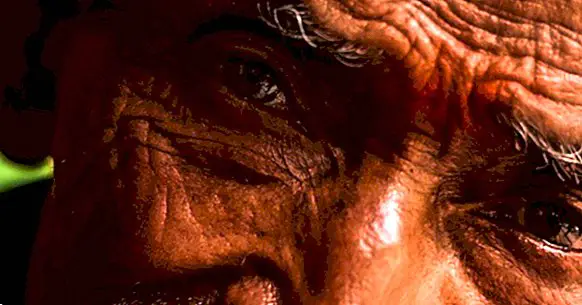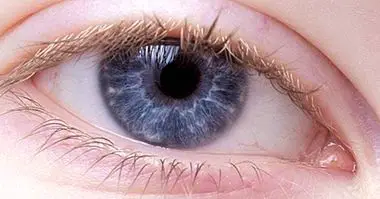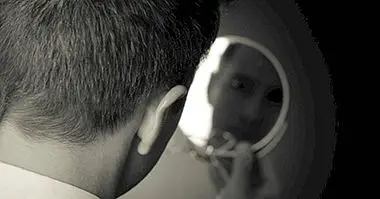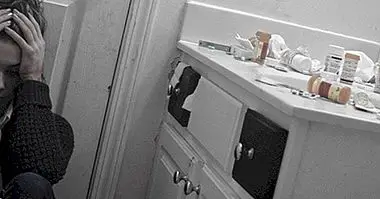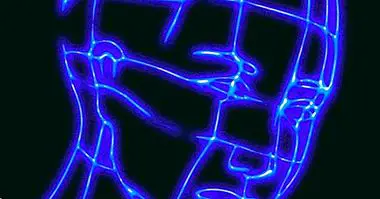Dementophobia: symptoms, causes and treatment of this phobia
Mental health is something that, fortunately, is increasingly being given a higher level of attention. Little by little, the population is becoming more aware of the existence of different alterations and psychiatric disorders and of the difficulties they pose, not being weird to hear about someone with depression or anxiety disorders, and the need to seek professional help in the presence of symptoms .
However, there continues to be a great social stigma towards mental disorder, especially in cases such as schizophrenia, as well as a great fear towards everything it represents.
In some people there is also an excessive, invalidating and even pathological fear towards the fear of suffering a psychiatric disorder, to which colloquially it is usually called (although it is a derogatory, inaccurate term that ignores a large number of variables and generates a separation between "healthy" and "clinical" subjects that is not as bipolar as it appears) "going crazy", or losing reason. This is what happens to people with dementophobia .
- Related article: "Types of phobias: exploring the disorders of fear"
Dementophobia and its main implications
Also called agaphophobia or maniaphobia, dementophobia is conceptualized as the phobia of the possibility of going mad or losing reason. It is a specific phobia that can cause severe limitations in the life of the sufferer. As a phobia, it is the appearance of an irrational and disproportionate fear of the danger that a certain stimulus really implies . In general, fear is usually recognized as excessive by the subject.
Exposure to the stimulus itself or the possibility that it appears triggers a high level of anxiety, which in turn usually generates physiological alterations such as sweating, tremors, tachycardia, hyperventilation or even anxiety crisis. This anxiety pushes the active avoidance or escape from the situation in which the phobic stimulus appears or may appear.
In the case at hand, the fear of "going crazy" implies a high level of anxiety in the face of any situation that generates such possibility or exposure to situations in which the subject may lose control or have diminished abilities, as well as the connection of their own person with that which is related to the mental disorder (especially if it is severe) . This fear of loss of reasoning can be situations in which there is a permanent loss of abilities, but can also appear to situations in which the loss is transient.
We must bear in mind, as with other phobias, we are talking about a fear that must be disproportionate and irrational. We are not talking about there being a certain fear of suffering a psychological problem: it is highly doubtful that there is someone who really wants to suffer from a mental disorder, because it is something that in all cases generates great suffering or limitation to the sufferer. This not to mention disorders that generate cognitive deterioration , such as dementias. It is natural to fear to some extent the possibility of suffering a limitation or a progressive loss of capabilities.
The problem exists at the moment in which such fear generates by itself a limitation in the life of the subject and prevents a normative performance of their day to day, to the point of avoiding certain stimuli or people, and generating anxiety at the slightest possibility of that happens.
- You may be interested: "Types of dementia: the 8 forms of cognition loss"
Symptoms in day to day
Although it may seem that generally we are not exposed to situations that someone with fear of losing reason may fear, the truth is that in serious cases we can find a severe limitation in day to day .
People with dementophobia can suffer great anxiety in any type of situation in which they can interpret that they are suffering a loss of faculties or control of reality. Thus, for example, the loss of memory that occurs at the normative level with age will be cause for great anguish and quickly associated with dementia. Alterations such as memory lapses due to stress or fatigue or phenomena such as the tip of the tongue (You do not finish evoke the word you want to say even though you have the feeling that it is there) also generate a high level of suffering.
Another aspect to consider is the possible appearance of compulsive behaviors of verification, often assessing their mental state or their abilities. It is also likely the appearance of rigid and inflexible behavior patterns that make alterations in your mental state difficult (although it is natural that our abilities, emotions, motivations and levels of activation vary in the day to day).
Likewise the presence of perceptual alterations usually generates a high level of anxiety , avoiding any situation that may generate it. This could include the consumption of alcohol or other substances, but also some medications.
They also tend to avoid mental health centers and contact with people with different disorders, sometimes manifesting a clear rejection towards them. Although less common, it is also possible that exactly the opposite happens: that the fear of suffering from some type of problem or going crazy leads them to constantly frequent contact with professionals in the sector who confirm that they do not suffer any alteration.
In extreme cases the subject can become completely isolated, damaging the social, interpersonal or even work environments (since they are likely to avoid situations of stress).
- Related article: "Types of Anxiety Disorders and their characteristics"
Causes of this phobia
There is no single cause for which dementophobia appears, this phobia having a multicausal origin that can be affected by several variables. In the first place, it is possible that there is a possible biological predisposition to suffer phobic reactions, born of a high physiological reactivity, which may end up triggering a phobia if the necessary environmental conditions are met.
Bearing in mind that suffering from a mental disorder involves a certain level of difficulties and suffering, dementophobia arises from a fear to some extent adaptive in the sense that seeks the protection of the subject before a state considered aversive . Likewise, the high social stigma that, although it has diminished today, continues to exist around mental health problems conditions the subjects, in such a way that the association of loss of control with pain, loss and social marginalization increases the chances of suffering from this type of phobia.
In this sense, the appearance of dementophobia can also favor the fact of having been raised in an environment and with rigid parental models in which special emphasis has been placed on the importance of reason and control. In the same way, the opposite situation can also favor it: overprotective educational models in which the child does not have an exposure to reality and the existence of diversity in mental functioning between people.
The interpretation given to the mental disorder in the home of origin It can also be decisive: if it is seen as a punishment, or as something horrible that directly impedes the person's life, the fear will be greater.
Likewise, having observed during development (especially in childhood) and / or throughout life as people in our environment have suffered a neurodegenerative process or a mental disorder that generates a high level of dysfunctionality or that has caused damage to one's own affected or others can trigger the fear of suffering a similar problem, to the point of causing great anxiety and culminate with the appearance of phobia.
Treating dementophobia
The treatment of dementophobia is certainly complex, since, unlike phobias such as animal-type phobias (for example spiders or dogs) or specific situations such as storms, airplanes or heights, there is no clear stimulus the subject avoids physically, being the fear directed towards a mental aspect not visible to the naked eye.
In any case, dementophobia is treatable . Although the situations that generate fear can be very diverse, it is possible to elaborate a hierarchy with the patient in order to make a gradual exposure therapy or a systematic desensitization. This point is one of the most fundamental, because it generates that the subject is able to resist the anxiety in situations that generate it and with time it is diluted.
Likewise, another fundamental point and especially in this type of phobia is the treatment of the patient's beliefs and fears, in such a way that not only anxiety decreases but also they learn to interpret reality in a more adaptive way. In the first place, it would be necessary to analyze the meaning of what is "going crazy" or lose the reason for the subject, if he has experienced any situation in which this has happened or what it could imply for him. Also the fears that may be behind. After that, would proceed to perform a cognitive restructuring , posing the beliefs and fears of the subject as a hypothesis and later trying to build other interpretations about it.
In extreme cases, the use of tranquilizing and anxiolytic drugs can be assessed in order to lower the level of activation and be able to work more efficiently at the psychological level.

